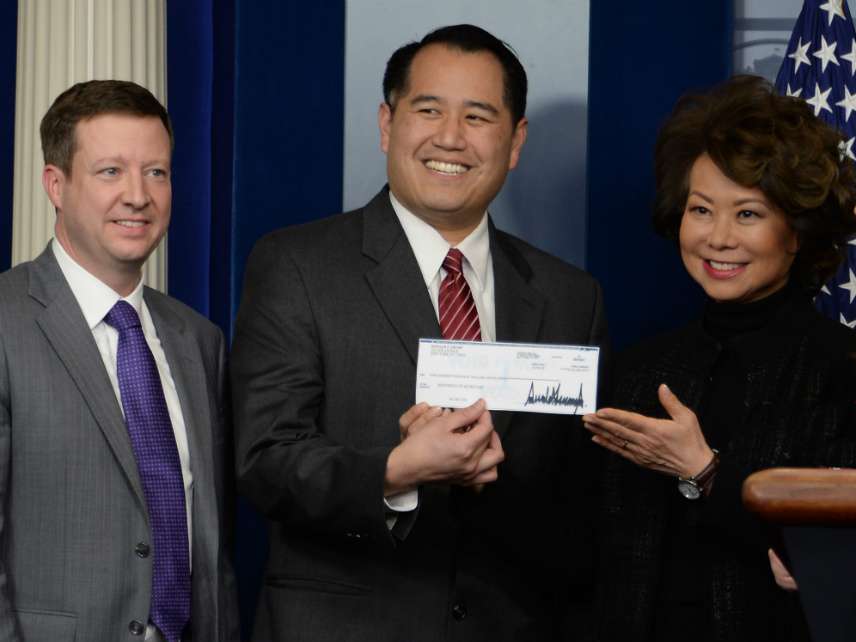Trump Donates $100,000 to the Department of Transportation. How Much Infrastructure Will That Buy?
The president's gift underscores how little consumers of road and rail pay for the infrastructure they use.

President Donald Trump, gold-hearted philanthropist that he is, has donated his $100,000 fourth quarter salary to the Department of Transportation.
This is not the first time Trump has signed away his salary to a government agency, having previously given his quarterly earnings to the Department of Health and Human Services, the National Park Service, and the Education Department to promote different signature initiatives.
In this case, the gift was made to hype his just-released $1.5 trillion infrastructure plan. But while the check was obviously a PR stunt, the president might still be interested to learn just how much infrastructure it will actually buy.
According to a new report from the Reason Foundation (the nonprofit that publishes this website), an average mile of new highway costs the taxpayer $91,992—just under Trump's $100,000 gift. But this average obscures huge variations in the capital costs of new roads.
Were Trump looking to reward his diehard base in rural Missouri, his benevolent largess could build nearly 4 miles of road. In his home state of New York, by contrast, the same amount would pay for a little more than a third of a mile. If Trump wanted to build more lanes to one of his New Jersey casinos, his bequest would buy a paltry tenth of a mile of road.
Infrastructure is not just highways, and Democrats have been hounding Trump about not spending enough on grants to mass transit. His proposal likely needs at least some bipartisan support to get through Congress, so Trump might want to consider directing his earnings to urban light rail projects.
Here, though, his dollars will buy even less.
In Nashville, the city government is contemplating a $5.2 billion, 26-mile light rail and rapid bus service expansion. If Trump were to contribute his $100,000 to the cause, he could purchase a cool 2.84 feet of new track.
Seattle's Lynnwood light rail project instead is promising 8.5 miles of new light rail for $2.9 billion. There, Trump's donation would procure a whole foot and a half of new, serviced track.
Of course, the president would be unlikely to spend his own personal funds for such little return, as indeed would pretty much anyone. That is why all big commuter rail projects and the vast majority of highway projects are not backed by investors writing checks or users paying out of pocket for the project over time. Instead they rely on a tax-borrow-and-spend system that's flush with federal funding, one that encourages politicians to demand as much as they can get from the national treasury while obscuring the true cost of the roads and transit systems that people use.
The legislative proposal that the administration released Monday does include a number of reforms that would give user fee–supported projects a boost. These provisions would loosen the rules for interstate tolling, allow airports to more easily charge passenger fees for facility upgrades, and remove restrictions on private infrastructure investment. Less happily, the bill would dump another $200 billion of taxpayers' money into the system, a number the administration is already intimating could rise higher still.
Were commuters confronted with the actual bill for these infrastructure projects, they might rethink how the money is spent. They might demand more necessary improvements, or maybe forgo some projects all together. But no one is paying the full cost of the infrastructure they use. Not even Trump.
Rent Free is a weekly newsletter from Christian Britschgi on urbanism and the fight for less regulation, more housing, more property rights, and more freedom in America's cities.


Show Comments (30)